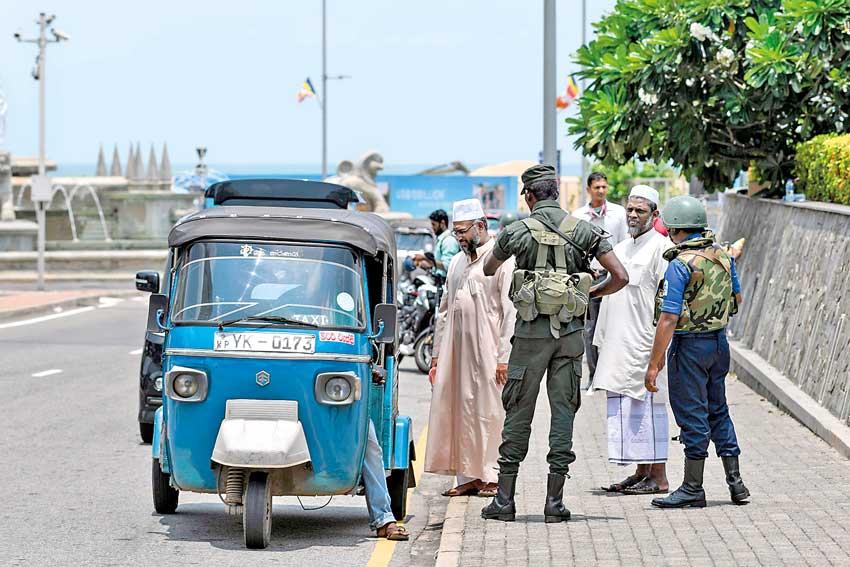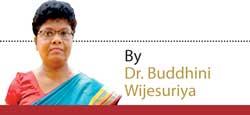Reply To:
Name - Reply Comment

This picture taken at a check point in Colombo might offer an example of how communication issues might crop up due to linguistic barriers (Pix AFP)
In this regard, a linguistic climate that prevails in the country can vastly be utilised as an appropriate instrument
In other words, language, which is unique to human being, is an impressive tool of societal control
Distinguishing the languages or to select and treat one language as dominant will lead to a social grievousness in a country like Sri Lanka
 International Mother Language Day is annually celebrated’ on February 21 annually to promote unity in diversity through multilingualism and multiculturalism since its official declaration by the United Nations in 2002. The United Nations has announced the theme of the International Mother Language Day this year as “Fostering multilingualism for inclusion in education and society” as it recognises that multilingualism can advance inclusion and the Sustainable Development Goals (SDG) and ensuring that no one is left behind. How could multilingualism be used in the Sri Lankan context to achieve and maintain such qualities?
International Mother Language Day is annually celebrated’ on February 21 annually to promote unity in diversity through multilingualism and multiculturalism since its official declaration by the United Nations in 2002. The United Nations has announced the theme of the International Mother Language Day this year as “Fostering multilingualism for inclusion in education and society” as it recognises that multilingualism can advance inclusion and the Sustainable Development Goals (SDG) and ensuring that no one is left behind. How could multilingualism be used in the Sri Lankan context to achieve and maintain such qualities?
Sri Lanka is a multi-ethnic and multi-religious country with communities well spread out in all parts of the island. The substantially extended cultural contact and interaction between Sri Lanka and India since ancient times, the Arab traders having taken control of much of the maritime connectivity and trade on the Indian Ocean including that of Sri Lanka from the early Medieval times and subsequent waves of European Colonialism, namely, the Portuguese, Dutch and British over the centuries have contributed to make Sri Lanka such a multi-ethnic and multi-religious country.
The last national and general census of Sri Lanka was taken in 2011. According to the statistical data of the census the Sinhalese form 74.90% in a total population of 20,359,439 in Sri Lanka while Sri Lankan Tamils, Sri Lankan Moors, Indian Tamils, Sri Lankan Malays and BurgherslEurasian form 11.15%, 9.30%, 4.12%, 0.22% and 0.19% respectively. Similarly, 0.13% configures other minority ethnic groups. Further, according to the demographic information revealed in the census 70.10% of the total population is Buddhists. Hindus make up 12.58%. Muslims, Christians and others are 9.66%, 7.62 and 0.03 respectively. In terms of the statistics of census and the population estimates, the composition of the multi-ethnic and multi-religious groups in Sri Lanka is obvious in the current context. How could all these multi-groups live together with peace and harmony sharing the common thoughts and characteristics as belonging to a one family designated as ‘Sri Lankans’?
Source of power
Although, much is said about the necessity of having peace and harmony in the country, only little thoughts are on how to achieve and maintain such qualities. In this regard, a linguistic climate that prevails in the country can vastly be utilised as an appropriate instrument. Language can perform in all spheres of social life to accumulate or to separate people. Language rights can serve to unite the society while the violation of the same can cause to a brutal clash. ‘Therefore, a high concern and commitment on multilingualism is pivotal in a country like Sri Lanka where a diverse group of communities live in. In other words, language, which is unique to human being, is an impressive tool of societal control. Language is a source of power, social mobility and opportunities.
Distinguishing the languages or to select and treat one language as dominant will lead to a social grievousness in a country like Sri Lanka, where multi-cultural communities live in, such distinction or restriction will be great injustice that discriminate the proficiency in other languages that prevail in the country. On the other hand, there will perhaps be a demand on everyone to learn and work in “dominant language” if to achieve educational, professional and other opportunities available in the country. Such linguistic demand will create the issues centred on the ethno-nationalism giving chances to the communal riots, disorders, dissensions and disobedience campaigns in the country. Eventually, it will create in the country, difference, disunity and destruction rather than the qualities of unity and strength. We, as Sri Lankans have already experienced such awful situations during the past and more recently during the war that prevailed in the country.
This was the situation by and large in the northern half of the island where there was a war between the Liberation Tamil Tigers of Eelam (LTTE) and Government troops for nearly three decades; which was fortunately resolved in 2009 paving the way for peace and tranquility. The objective of the LTTE was to create a mono-ethnic and mono-linguistic separate State in Sri Lanka. It is very appreciative to follow the path to the conclusion of the conflict; the Government of Sri Lanka appointing the Lessons Learnt and Reconciliation Commission (LLRC) with a view to provide equity and justice for all Sri Lankans. The authorities must never mistreat, oppress or harass the other languages prevail in the country. There is no argument that ‘Nationalism’ indicates and forms uniformity.
Nevertheless, in a country with diversified communities, ‘Nationalism’ should not emerge with hard-and-fast rules- one and only-but with multi-social and multicultural values where the assets such as multilingualism and multi-religio be treated without a great difference. Language is an integral part of culture. A person’s mother tongue will show his particular culture. Therefore, the languages prevalent in the society will also exhibit nature and culture connected with those languages. Thus, consideration of only one language as important will not only cause a fadeout the other languages prevalent in the society, but make disappear the cultural and spiritual values of other communities that use different languages. It must always be remembered that it will not be possible to conceive advance inclusion, and the SDG in a country which have diverse communities even if one community is left behind.
As previously mentioned, we as Sri Lankans have now overcome the dreadful period of the Eelam war. It is a vital need at this time that we all must determine with inspiration to constitute Sri Lanka as a united country and compensate social and cultural mistakes we have done in the past. How could linguistic diversity be utilised to form such a united Sri Lanka? In this context learning languages contributes to mutual understanding. We all live in an interdependent society, where the proficiency in other languages becomes essential. All citizens of Sri Lanka must be encouraged to learn the languages that are prevalent in the country and to make ‘use of literature and other material of those languages because religion, tradition and heritage of every community will be expressed with their medium of communication. Accordingly, effort must be put to learn and appreciate other languages which will then be a mark of respect and value to other communities. With such an understanding, tolerance and respect of the values of other cultures each citizen will realise that he or she has to excel beyond ones own cultural borders and share the ideas and interests with the other cultural identities. Such circumstances would foster a democratic social and cultural atmosphere also facilitating the fundamental expression of diverse social and cultural identities of the country largely because of the languages that are prevalent in a country are a reflection to the cultural richness of that country.
The strength is unity and vice versa. In this sense the linguistic strength will be a major component that can unite Sri Lanka. We all must remember that if we do not honour all the languages used in this country it will be a painful blow that we direct at the diversified unity of the country. Therefore, we should not neglect or condemn any of the languages that prevail in this country.
We, as Sri Lankans, must get together to form a single society that comprises different groups of people despite linguistic barriers; which is vital for the climate of peace and harmony to sustain. In other words we must have one nation which has evolved into diverse communities. Such ‘sense of oneness’ will eradicate social conflicts. We shall determine to pay greater attention on the multilingualism in our country in order to safeguard unity in diversity of Sri Lanka.
(The writer is an archaeologist and an independent researcher)